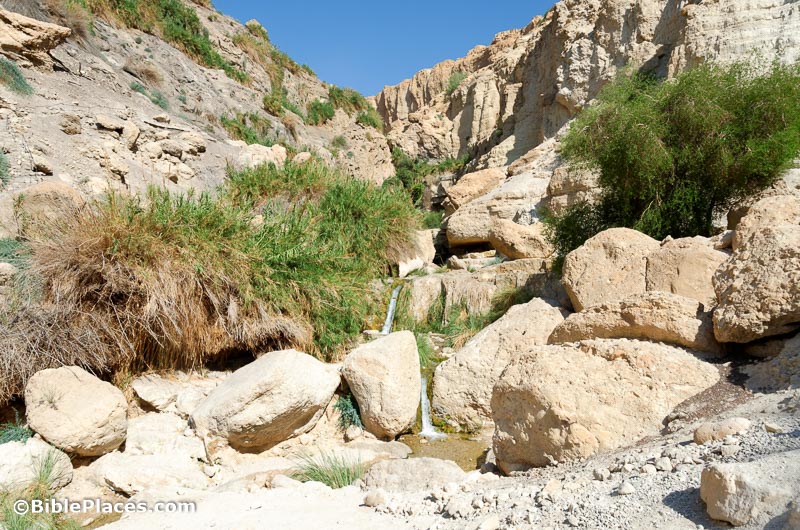If you needed a quick summary of information about En-Gedi, where would you go? I’m doing research for an essay in a future volume of the Lexham Geographic Commentary series and this morning I was studying En Gedi in relation to David’s flight from Saul. I went through a dozen commentaries and pulled out various tidbits about David’s time in the area. Then I went to my standard Bible dictionaries. I usually consider Anchor Bible Dictionary to be the best, and so I started there. The article was decent. Then I went to others to see what else they had (ISBE, NIDB, EBD).
I recently pulled into my line-up the Lexham Bible Dictionary. I’ve been a bit skeptical of its value because it’s not a printed work and they used a wide variety of writers (including many students). But when I pulled up the LBD entry on En-Gedi I was immediately impressed. It was much longer and more thorough than the others. In fact, I think its length is probably twice that of the other four combined. That means there are separate sections on En-Gedi in Ancient Accounts (subdivided into biblical and extrabiblical), Geography and Geology (no one else has much on this), and Archaeological Investigations (which is subdivided into many sections). Then it closes with a bibliography, which is easily better than any I’ve seen elsewhere.
A final delight was to discover the author: Christian Locatell. I know this guy! He’s one of our ace creators of the Photo Companion of the Bible! (Many years before that, he was my student and he gave me various nicknames, but we won’t get into that…) He made a big contribution to our Acts volume, and his work on Romans has been spectacular! (That volume should be available in November.) So I figured I would write a little blogpost with three purposes: (1) to share some interesting tidbits about En-Gedi that you may not know; (2) to suggest you include the Lexham Bible Dictionary as part of your Bible study tools; and (3) to let you know that the author of this terrific article is creating more amazing resources for BiblePlaces followers.
Here are five ten interesting observations about En-Gedi from Dr. Locatell’s article:
1. Edward Robinson was the first modern explorer to identify En Gedi, and he did so on the basis of its Arabic name: Ain Jiddi.
2. David hid from Saul in the “strongholds” of En-Gedi (1 Sam 23:29), but when he wrote a psalm praising God for saving him from Saul, he called God his “stronghold” (2 Sam 22:2; Ps 18:2).
3. En-Gedi is believed to be the home of the Essenes (and not Qumran) by some scholars.
4. 700 inhabitants of En-Gedi were slaughtered by the Sicarii in the First Jewish Revolt.
5. Many ancient accounts rave about En-Gedi’s lush fertility.
[In one paragraph, Locatell quotes Karmon, Baly, and Efrat and Orni! I don’t think I’ve ever seen such geographical richness in one place. It’s a great paragraph, but too long to copy here. I am certainly proud to be this guy’s first geography teacher.]
6. Clouds over En-Gedi are rare, and the flash floods in the area are the result of the top rock layers being unable to absorb much of rainfall.
7. Most of the springs along the western shore of the Dead Sea have a high saline content, making En-Gedi such a precious resource of sweet water.
8. Between 1949 and 1972, there were seven archaeological expeditions to En-Gedi. [I had no idea there were that many.]
9. An Aramaic mosaic from the 5th-century AD synagogue refers to the “secrets of the town.”
10. Excavations on the northern slope of the tell revealed workshops and equipment probably used for producing the perfumes for which En-Gedi was famous.
There you have it. This is the best article on En-Gedi I know of. Thanks to Lexham and to Locatell for serving us so well.
BTW, we have some great photos of En-Gedi in our Judah and the Dead Sea volume.

